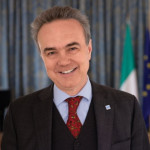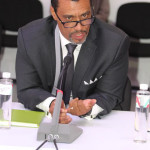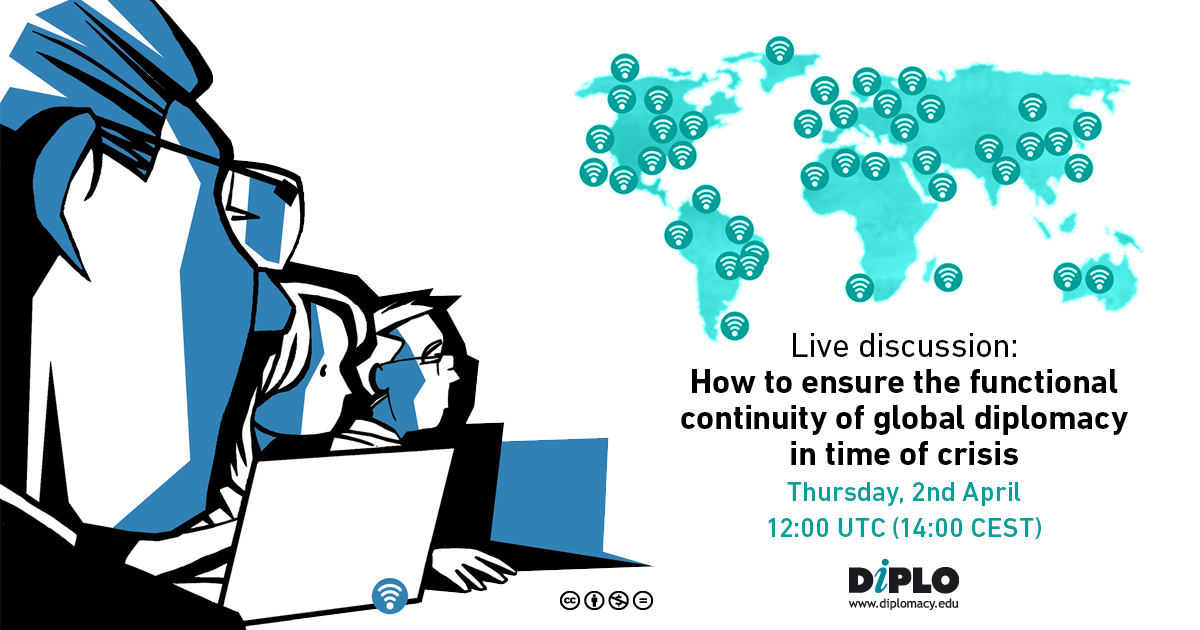In times of crisis, global cooperation is essential. Yet, COVID-19 has grounded global diplomacy with the cancellation of meetings and negotiations. In our next live discussion on COVID-19, on Thursday, 2nd April 2020 at 8 am EDT, we will discuss ways of ensuring the functional continuity of global diplomacy. Join us online.
In response to the COVID-19 crisis which has grounded onsite meetings and conferences, G7 and EU leaders have taken to video-conferencing to continue their work. The UN and diplomatic services worldwide are now in the search of new solutions for functional continuity during these testing times.
Our just-in-time live discussion will reflect on the reactions to COVID-19’s challenges for global diplomacy, and plans for the future. In particular, the discussion will focus on the functionality of new solutions, security risks, protocol challenges, and the need to ensure that small and developing countries are not marginalised in this transition towards online meetings.
We welcome your active participation in our live discussion.
Experts:
 Amb. Stefano Baldi is a career diplomat in the Italian Ministry of Foreign Affairs and International cooperation. Before the appointment as Ambassador of Italy to Bulgaria he was a Training Director at the Ministry since 2011. He was previously Head of the Science and Technology Cooperation Department of the Ministry of Foreign Affairs from 2010 to 2011. From 2006 to 2010 he was First Counsellor at the Permanent Mission of Italy to the European Union, responsible for legal and financial aspects of the Common Foreign and Security policy as Relex Counsellor. He has also served at the Permanent Mission of Italy to the International Organisations in Geneva and to the Permanent Mission of Italy to the United Nations in New York in charge for disarmament affairs. He has been the first head of the Statistical Office of the Ministry from 2000 to 2002.
Amb. Stefano Baldi is a career diplomat in the Italian Ministry of Foreign Affairs and International cooperation. Before the appointment as Ambassador of Italy to Bulgaria he was a Training Director at the Ministry since 2011. He was previously Head of the Science and Technology Cooperation Department of the Ministry of Foreign Affairs from 2010 to 2011. From 2006 to 2010 he was First Counsellor at the Permanent Mission of Italy to the European Union, responsible for legal and financial aspects of the Common Foreign and Security policy as Relex Counsellor. He has also served at the Permanent Mission of Italy to the International Organisations in Geneva and to the Permanent Mission of Italy to the United Nations in New York in charge for disarmament affairs. He has been the first head of the Statistical Office of the Ministry from 2000 to 2002.
Ms. Chrystiane Roy is the First Secretary at the Permanent Mission of Canada to the UN in Geneva and the WTO. Roy has been following all aspects of digital policy and cybersecurity across all UN based agencies in Geneva since 2015. She joined Global Affairs Canada in 2002. Prior to her arrival in Geneva, she was Deputy Director in the Disarmament and Non-proliferation Division, working on issues relating to biological and chemical weapons, including related export control mechanisms as well as being Canada’s National Authority for the Chemical Weapons Convention. Overseas, she completed assignments in the Canadian embassies in Turkey and Bosnia-Herzegovina. She is also a graduate of a number of DiploFoundation courses.
 Mr Moctar Yedaly is the Head of the Information Society of the African Union Commission. By vocation, Yedaly is a telecom, satellite and computer engineer with an MBA in international Business. He holds degrees from George Washington University, Amity University and Institute of Informatics. He has more than 20 years of international experience in policy preparation and implementation, program development and management, partnerships development, operational management, and capacity building. Yedaly has an excellent understanding of the global political and business systems including government institutions in Africa and the Middle East. He also has excellent knowledge of the digital economy and Internet governance, as well as the requirements of the developing world. He has worked for and with private companies and international organisations in the US and Africa. He is fluent in major languages spoken in Africa and the Middle East, namely, English, French and Arabic.
Mr Moctar Yedaly is the Head of the Information Society of the African Union Commission. By vocation, Yedaly is a telecom, satellite and computer engineer with an MBA in international Business. He holds degrees from George Washington University, Amity University and Institute of Informatics. He has more than 20 years of international experience in policy preparation and implementation, program development and management, partnerships development, operational management, and capacity building. Yedaly has an excellent understanding of the global political and business systems including government institutions in Africa and the Middle East. He also has excellent knowledge of the digital economy and Internet governance, as well as the requirements of the developing world. He has worked for and with private companies and international organisations in the US and Africa. He is fluent in major languages spoken in Africa and the Middle East, namely, English, French and Arabic.
Moderator:
 Prof. Jovan Kurbalija is the Founding Director of DiploFoundation and Head of the Geneva Internet Platform. In 2018 and 2019, he served as co-Executive Director of the UN Secretary General’s High Level Panel on Digital Cooperation. Previously Prof. Kurbalija was a member of the UN Working Group on Internet Governance (2004-2005) and a Special Advisor to the Chairman of the UN Internet Governance Forum. Between 2013 and 2014, he was a member of the High Level Multistakeholder Committee for NETmundial (2013‒2014). His book, An Introduction to Internet Governance, has been translated into 9 languages and is used as a textbook for academic courses worldwide.
Prof. Jovan Kurbalija is the Founding Director of DiploFoundation and Head of the Geneva Internet Platform. In 2018 and 2019, he served as co-Executive Director of the UN Secretary General’s High Level Panel on Digital Cooperation. Previously Prof. Kurbalija was a member of the UN Working Group on Internet Governance (2004-2005) and a Special Advisor to the Chairman of the UN Internet Governance Forum. Between 2013 and 2014, he was a member of the High Level Multistakeholder Committee for NETmundial (2013‒2014). His book, An Introduction to Internet Governance, has been translated into 9 languages and is used as a textbook for academic courses worldwide.
Registrations are open:


